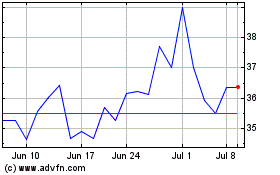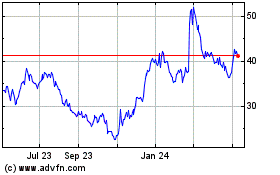Celldex Therapeutics, Inc. (Nasdaq:CLDX) today announced that it
has initiated an open-label Phase 1/2 safety and tolerability study
of glembatumumab vedotin in patients with unresectable stage IIIB
or IV, gpNMB-expressing, advanced or metastatic squamous cell
carcinoma (SCC) of the lung, who have progressed on prior
platinum-based chemotherapy. Glembatumumab vedotin is a fully human
monoclonal antibody-drug conjugate (ADC) that targets gpNMB, a
protein overexpressed by multiple tumor types, including SCC of the
lung, where approximately 85 percent of patients overexpress the
marker. Overexpression of gpNMB has been shown to promote the
invasion and metastasis of cancer and has been associated with poor
clinical outcome. Celldex has entered into a collaborative
relationship with PrECOG, LLC, which represents a research network
established by the Eastern Cooperative Oncology Group (ECOG), and
PrECOG, LLC will conduct the study.
“While checkpoint inhibitor therapy has been an important
development for patients with squamous cell lung cancer, the
majority of patients still require new, effective treatment
options—especially targeted therapies,” said Thomas Davis, M.D.,
Executive Vice President and Chief Medical Officer of Celldex
Therapeutics. “gpNMB, the target of glembatumumab vedotin, is
strongly expressed in the vast majority of squamous cell lung
cancers. Glembatumumab vedotin has consistently induced notable
response rates in other difficult to treat cancers that overexpress
gpNMB. We hope to elicit similar activity in squamous cell
carcinoma and look forward to completing this study.”
Glembatumumab vedotin is currently being evaluated in
patients with metastatic triple negative breast cancers that
overexpress gpNMB in the registrational METRIC study, as well as in
a Phase 2 study in patients with advanced melanoma who have
progressed after at least one checkpoint inhibitor therapy and, if
applicable, BRAF- or MEK-targeted therapy. It has been
previously evaluated in a Phase 2 study in advanced breast cancer
(the EMERGE study), a Phase 1/2 study in advanced breast cancer and
a Phase 1/2 study in patients with unresectable stage III or IV
melanoma. Also, Celldex and the National Cancer Institute (NCI)
have entered into a Cooperative Research and Development Agreement
(CRADA) under which the NCI is sponsoring two studies of
glembatumumab vedotin—one in uveal melanoma and one in pediatric
osteosarcoma. Both studies are currently open to enrollment.
Study DesignThis Phase 1/2 study will enroll
patients with gpNMB-positive stage IIIB or IV non-small cell lung
cancer (NSCLC) of squamous histology who have previously been
treated with platinum-based chemotherapy. gpNMB positivity will be
determined by a greater than, or equal to, five percent gpNMB
expression in tumor epithelial cells. Glembatumumab vedotin will be
administered once every three weeks until disease progression or
intolerance. The study is expected to include 10 sites in the
United States.
The study will include a dose-escalation phase followed by a
two-stage Phase 2 portion (Simon two-stage design). The Phase 1,
dose-escalation portion of the study will assess the safety and
tolerability of glembatumumab vedotin at the current dose of 1.9
mg/kg and then 2.2 mg/kg in order to determine whether higher
dosing is feasible in this population. The first stage of the Phase
2 portion will enroll approximately 20 patients, and if at least
two patients achieve a partial response or complete response, a
second stage may enroll an additional 15 patients. The primary
objective of the Phase 2 portion of the study is to assess the
anti-tumor efficacy of glembatumumab vedotin in squamous cell lung
cancer as measured by objective response rate (ORR). Secondary
objectives of the study include analyses of safety and tolerability
and further assessment of anti-tumor activity across a broad range
of endpoints.
About Squamous Cell Lung CancerLung cancer is
the leading cause of cancer related deaths in the world, with an
estimated one million new cases worldwide and around 216,000 in the
U.S. annually. Non-small cell lung cancer (NSCLC) represents more
than 80 percent of all lung cancers, and squamous cell carcinoma
(SCC) of the lung accounts for approximately 30 to 40 percent of
NSCLC. While new treatment options, especially targeted therapies,
have become available for patients with adenocarcinoma, another
type of NSCLC, clinical studies have not identified targeted
therapies with major benefits for patients with SCC of the lung.
Recent improvements for patients with SCC of the lung include
checkpoint immunotherapy; however, not all patients respond to this
treatment, and new therapeutic options are needed. Approximately 85
percent of patients with SCC of the lung have tumors that
overexpress gpNMB, the target of glembatumumab vedotin.
About Glembatumumab VedotinGlembatumumab
vedotin (CDX-011) is a fully human monoclonal antibody-drug
conjugate (ADC) that targets glycoprotein NMB (gpNMB). gpNMB is a
protein overexpressed by multiple tumor types, including breast
cancer, melanoma, lung cancer, head and neck cancer, uveal
melanoma, osteosarcoma, pancreatic cancer and glioblastoma. gpNMB
has been shown to be associated with the ability of the cancer cell
to invade and metastasize and to correlate with reduced time to
progression and survival in breast cancer. The gpNMB-targeting
antibody, CR011, is linked to a potent cytotoxic, monomethyl
auristatin E (MMAE), using Seattle Genetics' proprietary
technology. Glembatumumab vedotin is designed to be stable in the
bloodstream but to release MMAE upon internalization into
gpNMB-expressing tumor cells, resulting in a targeted cell-killing
effect. Glembatumumab vedotin is in development for the treatment
of locally advanced or metastatic breast cancer with an initial
focus in triple negative disease, stage III and IV melanoma,
squamous cell lung cancer, uveal melanoma and osteosarcoma.
About Celldex Therapeutics, Inc.Celldex is
developing targeted therapeutics to address devastating diseases
for which available treatments are inadequate. Our pipeline is
built from a proprietary portfolio of antibodies and
immunomodulators used alone and in strategic combinations to create
novel, disease-specific therapies that induce, enhance or suppress
the body's immune response. Visit
www.celldex.com.
Forward Looking StatementThis release contains
"forward-looking statements" made pursuant to the safe harbor
provisions of the Private Securities Litigation Reform Act of 1995,
including those related to the Company's strategic focus and the
future development and commercialization (by Celldex and others) of
glembatumumab vedotin ("glemba"; CDX-011), varlilumab (“varli”;
CDX-1127), and other products and our goals for 2016.
Forward-looking statements reflect management's current knowledge,
assumptions, judgment and expectations regarding future performance
or events. Although management believes that the expectations
reflected in such statements are reasonable, they give no assurance
that such expectations will prove to be correct and you should be
aware that actual results could differ materially from those
contained in the forward-looking statements. Forward-looking
statements are subject to a number of risks and uncertainties,
including, but not limited to, our ability to successfully complete
research and further development and commercialization of
glembatumumab vedotin and other drug candidates; our ability to
obtain additional capital to meet our long-term liquidity needs on
acceptable terms, or at all, including the additional capital which
will be necessary to complete the clinical trials that we have
initiated or plan to initiate; the uncertainties inherent in
clinical testing and accruing patients for clinical trials; our
limited experience in bringing programs through Phase 3 clinical
trials; our ability to manage and successfully complete multiple
clinical trials and the research and development efforts for our
multiple products at varying stages of development; the
availability, cost, delivery and quality of clinical and commercial
grade materials produced by our own manufacturing facility or
supplied by contract manufacturers, who may be our sole source of
supply; the timing, cost and uncertainty of obtaining regulatory
approvals; our ability to maintain and derive benefit from the Fast
Track designation for glembatumumab vedotin which does not change
the standards for regulatory approval or guarantee regulatory
approval on an expedited basis, or at all; the failure of the
market for the Company's programs to continue to develop; our
ability to protect the Company's intellectual property; the loss of
any executive officers or key personnel or consultants;
competition; changes in the regulatory landscape or the imposition
of regulations that affect the Company's products; and other
factors listed under "Risk Factors" in our annual report on Form
10-K and quarterly reports on Form 10-Q.
All forward-looking statements are expressly qualified in their
entirety by this cautionary notice. You are cautioned not to place
undue reliance on any forward-looking statements, which speak only
as of the date of this release. We have no obligation, and
expressly disclaim any obligation, to update, revise or correct any
of the forward-looking statements, whether as a result of new
information, future events or otherwise.
Contact:Sarah CavanaughVice President of
Investor Relations & Corp Communications(781)
433-3161scavanaugh@celldex.com
Charles LilesManager of Investor Relations & Corp
Communications(781) 433-3107cliles@celldex.com
Media Contact: Dan BudwickPure Communications, Inc.(973)
271-6085dan@purecommunicationsinc.com
Celldex Therapeutics (NASDAQ:CLDX)
Historical Stock Chart
From Mar 2024 to Apr 2024

Celldex Therapeutics (NASDAQ:CLDX)
Historical Stock Chart
From Apr 2023 to Apr 2024
